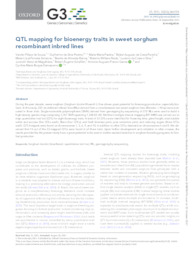QTL mapping for bioenergy traits in sweet sorghum recombinant inbred lines.
QTL mapping for bioenergy traits in sweet sorghum recombinant inbred lines.
Autoria: SOUZA, V. F. de; PEREIRA, G. da S.; PASTINA, M. M.; PARRELLA, R. A. da C.; SIMEONE, M. L. F.; BARROS, B. de A.; NODA, R. W.; SILVA, L. da C. e; MAGALHAES, J. V. de; SCHAFFERT, R. E.; GARCIA, A. A. F.; DAMASCENO, C. M. B.
Resumo: During the past decade, sweet sorghum (Sorghum bicolor Moench L.) has shown great potential for bioenergy production, especially biofuels. In this study, 223 recombinant inbred lines (RILs) derived from a cross between two sweet sorghum lines (Brandes Wray) were evaluated in three trials. Single-nucleotide polymorphisms (SNPs) derived from genotyping by sequencing of 272 RILs were used to build a high-density genetic map comprising 3,767 SNPs spanning 1,368.83 cM. Multitrait multiple interval mapping (MT-MIM) was carried out to map quantitative trait loci (QTL) for eight bioenergy traits. A total of 33 QTLs were identified for flowering time, plant height, total soluble solids and sucrose (five QTLs each), fibers (four QTLs), and fresh biomass yield, juice extraction yield, and reducing sugars (three QTLs each). QTL hotspots were found on chromosomes 1, 3, 6, 9, and 10, in addition to other QTLs detected on chromosomes 4 and 8. We observed that 14 out of the 33 mapped QTLs were found in all three trials. Upon further development and validation in other crosses, the results provided by the present study have a great potential to be used in marker-assisted selection in sorghum breeding programs for biofuel production.
Ano de publicação: 2021
Tipo de publicação: Artigo de periódico
Unidade: Embrapa Milho e Sorgo
Palavras-chave: Bioenergia, Bioethanol, Linhagem, Quantitative trait loci, Sorghum Bicolor, Sorgo Açucareiro
Observações
1 - Por padrão são exibidas publicações dos últimos 20 anos. Para encontrar publicações mais antigas, configure o filtro ano de publicação, colocando o ano a partir do qual você deseja encontrar publicações. O filtro está na coluna da esquerda na busca acima.
2 - Para ler algumas publicações da Embrapa (apenas as que estão em formato ePub), é necessário ter, no celular ou computador, um desses softwares gratuitos. Sistemas Android: Google Play Livros; IOS: iBooks; Windows e Linux: software Calibre.
Acesse outras publicações
Acesse a Base de Dados da Pesquisa Agropecuária (BDPA) para consultar o acervo completo das bibliotecas da Embrapa.

